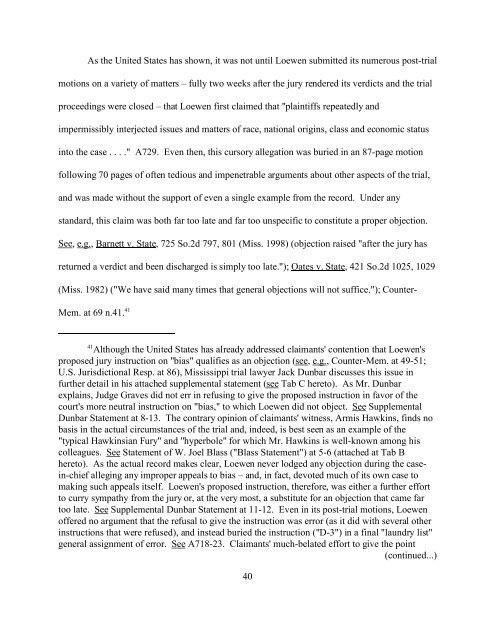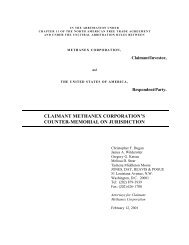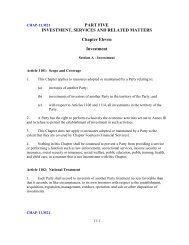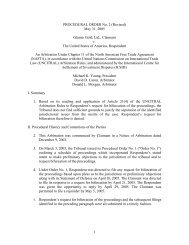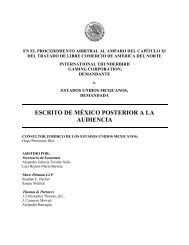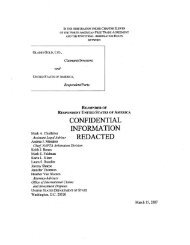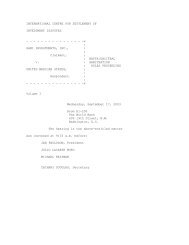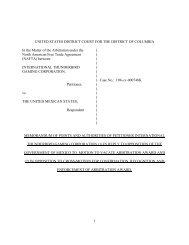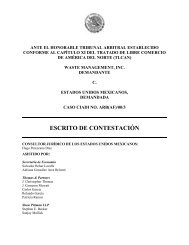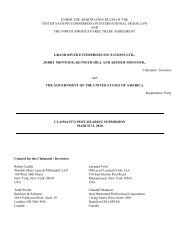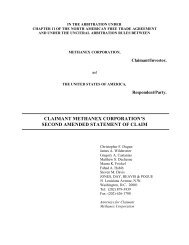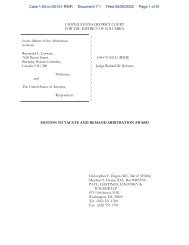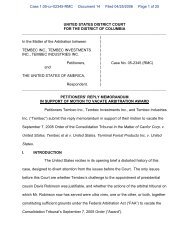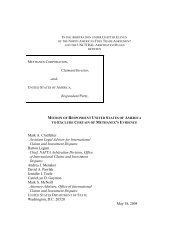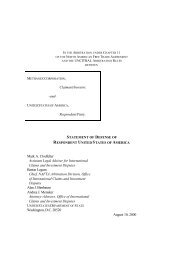THE LOEWEN GROUP, INC. and RAYMOND L. LOEWEN, v. THE ...
THE LOEWEN GROUP, INC. and RAYMOND L. LOEWEN, v. THE ...
THE LOEWEN GROUP, INC. and RAYMOND L. LOEWEN, v. THE ...
Create successful ePaper yourself
Turn your PDF publications into a flip-book with our unique Google optimized e-Paper software.
As the United States has shown, it was not until Loewen submitted its numerous post-trial<br />
motions on a variety of matters – fully two weeks after the jury rendered its verdicts <strong>and</strong> the trial<br />
proceedings were closed – that Loewen first claimed that "plaintiffs repeatedly <strong>and</strong><br />
impermissibly interjected issues <strong>and</strong> matters of race, national origins, class <strong>and</strong> economic status<br />
into the case . . . ." A729. Even then, this cursory allegation was buried in an 87-page motion<br />
following 70 pages of often tedious <strong>and</strong> impenetrable arguments about other aspects of the trial,<br />
<strong>and</strong> was made without the support of even a single example from the record. Under any<br />
st<strong>and</strong>ard, this claim was both far too late <strong>and</strong> far too unspecific to constitute a proper objection.<br />
See, e.g., Barnett v. State, 725 So.2d 797, 801 (Miss. 1998) (objection raised "after the jury has<br />
returned a verdict <strong>and</strong> been discharged is simply too late."); Oates v. State, 421 So.2d 1025, 1029<br />
(Miss. 1982) ("We have said many times that general objections will not suffice."); Counter-<br />
Mem. at 69 n.41. 41<br />
41 Although the United States has already addressed claimants' contention that Loewen's<br />
proposed jury instruction on "bias" qualifies as an objection (see, e.g., Counter-Mem. at 49-51;<br />
U.S. Jurisdictional Resp. at 86), Mississippi trial lawyer Jack Dunbar discusses this issue in<br />
further detail in his attached supplemental statement (see Tab C hereto). As Mr. Dunbar<br />
explains, Judge Graves did not err in refusing to give the proposed instruction in favor of the<br />
court's more neutral instruction on "bias," to which Loewen did not object. See Supplemental<br />
Dunbar Statement at 8-13. The contrary opinion of claimants' witness, Armis Hawkins, finds no<br />
basis in the actual circumstances of the trial <strong>and</strong>, indeed, is best seen as an example of the<br />
"typical Hawkinsian Fury" <strong>and</strong> "hyperbole" for which Mr. Hawkins is well-known among his<br />
colleagues. See Statement of W. Joel Blass ("Blass Statement") at 5-6 (attached at Tab B<br />
hereto). As the actual record makes clear, Loewen never lodged any objection during the casein-chief<br />
alleging any improper appeals to bias – <strong>and</strong>, in fact, devoted much of its own case to<br />
making such appeals itself. Loewen's proposed instruction, therefore, was either a further effort<br />
to curry sympathy from the jury or, at the very most, a substitute for an objection that came far<br />
too late. See Supplemental Dunbar Statement at 11-12. Even in its post-trial motions, Loewen<br />
offered no argument that the refusal to give the instruction was error (as it did with several other<br />
instructions that were refused), <strong>and</strong> instead buried the instruction ("D-3") in a final "laundry list"<br />
general assignment of error. See A718-23. Claimants' much-belated effort to give the point<br />
(continued...)<br />
40


